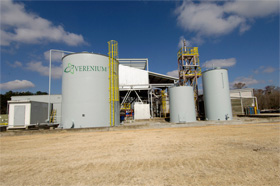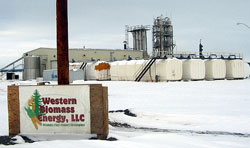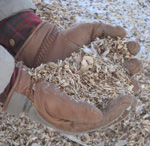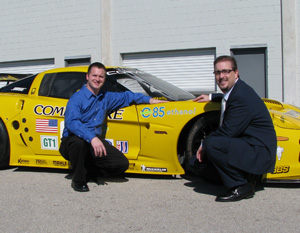 As we mentioned here before, one of the best ways to make biodiesel more mainstream is to get it into the mainstream of the trucking industry in this country.
As we mentioned here before, one of the best ways to make biodiesel more mainstream is to get it into the mainstream of the trucking industry in this country.
This story on eTrucker.com says Iowa-based Renewable Energy Group (REG) is offering a service to truck stops across the country to make biodiesel more available:
 REG’s Retail Biodiesel Blending Program, announced at the NATSO Show in Orlando, Fla., offers truck-stop operators both biodiesel injection equipment and a regular supply of high-quality biodiesel.
REG’s Retail Biodiesel Blending Program, announced at the NATSO Show in Orlando, Fla., offers truck-stop operators both biodiesel injection equipment and a regular supply of high-quality biodiesel.
Because REG can remotely monitor fuel levels in its biodiesel tanks, truck-stop operators can enjoy an automated reorder process to ensure they don’t run out, REG said. Truck stops also will be able to remotely adjust biodiesel blends daily, the company said.
The new service “offers a tremendous incentive for truck stops to adopt a biodiesel blend program while ensuring their customers have access to the highest-quality biodiesel available on the market today,” said Gary Haer, REG vice president of sales and marketing.
REG is also keeping up its end of the supply line as it has seven biodiesel plants in production, three under construction, and another two being developed.


 Biodiesel could save Americans billions of dollars, while making the country cleaner… that according to a spokesman for a Mississippi-based biodiesel manufacturer.
Biodiesel could save Americans billions of dollars, while making the country cleaner… that according to a spokesman for a Mississippi-based biodiesel manufacturer. A demonstration-scale cellulosic ethanol facility in Jennings, Louisiana is getting closer to completion.
A demonstration-scale cellulosic ethanol facility in Jennings, Louisiana is getting closer to completion.  In February 2007, Verenium broke ground on a 1.4 million gallon-per-year demonstration plant right next to its Jennings pilot site. The company hopes to finish this second plant before April, where Verenium will fine-tune its enzymes, ethanol production and feedstocks (primarily local cane bagasse) before it goes full-scale with a third plant.
In February 2007, Verenium broke ground on a 1.4 million gallon-per-year demonstration plant right next to its Jennings pilot site. The company hopes to finish this second plant before April, where Verenium will fine-tune its enzymes, ethanol production and feedstocks (primarily local cane bagasse) before it goes full-scale with a third plant. Entrants can submit a :30 second video to
Entrants can submit a :30 second video to  Colorado Springs, Colorado has been picked as the top municipal biodiesel fleet in the nation, according to Government Fleet Magazine.
Colorado Springs, Colorado has been picked as the top municipal biodiesel fleet in the nation, according to Government Fleet Magazine. The biodiesel documentary “Fields of Fuel” has walked away with one of the top honors at this year’s Sundance Film Festival at Park City, Utah.
The biodiesel documentary “Fields of Fuel” has walked away with one of the top honors at this year’s Sundance Film Festival at Park City, Utah.
 “Fields of Fuel” was chosen for the Audience Award for Best Documentary Film and was presented to Tickell by host William H. Macy. The film’s producer and other crew members accompanied Tickell onstage to accept the award. In his acceptance speech, Tickell said, “May we work together to create a green and sustainable future.”
“Fields of Fuel” was chosen for the Audience Award for Best Documentary Film and was presented to Tickell by host William H. Macy. The film’s producer and other crew members accompanied Tickell onstage to accept the award. In his acceptance speech, Tickell said, “May we work together to create a green and sustainable future.” A Japanese company is planning on building a bioethanol making the green fuel from a plant that is said to yield more ethanol per hectare than any other biofuel crop currently being grown.
A Japanese company is planning on building a bioethanol making the green fuel from a plant that is said to yield more ethanol per hectare than any other biofuel crop currently being grown. Cellulosic ethanol is now in production at the first small scale waste wood commercial facility operating in the U.S.
Cellulosic ethanol is now in production at the first small scale waste wood commercial facility operating in the U.S.  Located just 1 mile South of Upton, Wyoming, the plant was engineered, constructed and is operated by
Located just 1 mile South of Upton, Wyoming, the plant was engineered, constructed and is operated by  KL’s cellulosic ethanol plant is converting waste wood into a renewable fuel. The current production facility is utilizing soft woods, but successful test runs have occurred making use of waste materials such as cardboard and paper.
KL’s cellulosic ethanol plant is converting waste wood into a renewable fuel. The current production facility is utilizing soft woods, but successful test runs have occurred making use of waste materials such as cardboard and paper. U.S. Department of Energy Secretary Samuel W. Bodman
U.S. Department of Energy Secretary Samuel W. Bodman  The
The